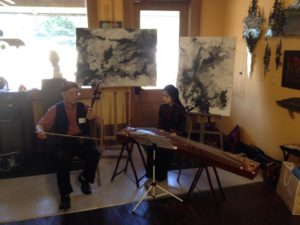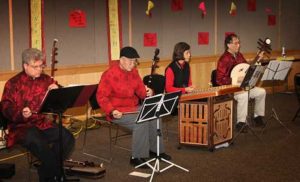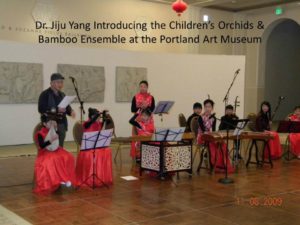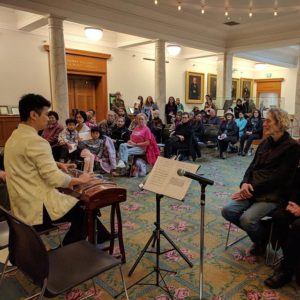Documenting Asian American Community Music Ensembles
The Orchids & Bamboo Chinese Music Ensemble
Biographies | Song Blogs | Interview Videos | Photo Gallery
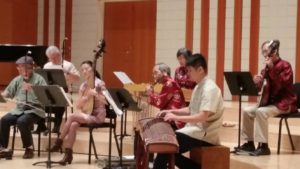
The Orchids & Bamboo Chinese Music Ensemble is a Portland, Oregon-based group that plays traditional Chinese instruments and a mixture of classic Chinese and modern music. Started in the early 2000s by Dr. Jiyu Yang, Louis Lim and Henry Kong, the ensemble has evolved over the years to include over a dozen multi-generational musicians. MAARC chose to feature this ensemble because it is an excellent example of a Chinese-music ensemble that was founded because the local Chinese community’s desire for Chinese music at their events, and that is based at a community arts school.
Dr. Jiyu Yang
Growing up in China in the late 80s and early 90s, I don’t really recall much traditional Chinese music being played around me other than seeing it in a period piece TV series or kung fu movie. The only music I had in cassette form was some dated Cantopop my dad listened to and a Taiwanese boy band named Xiao Hu Dui (Literal translation that I had to google: Little Tiger Group). After immigrating to the US, I was further removed from traditional Chinese instrumentation and I became a music nerd with a very UK and US-centric palette.
My reintroduction to traditional Chinese music wasn’t until 2009, when I got a job at the Tao of Tea inside the Lan Su Chinese Garden in Portland, Oregon. The garden is a nearly exact replica of a traditional garden from Suzhou (sister city of Portland), squeezed into a city block near downtown. With the teahouse similarly themed in traditional Chinese decoration, the manager, Evonne Tang, felt it would be fitting to feature classical Chinese instruments and musicians on a regular basis. One of the first musicians to be invited to play was Dr. Jiyu Yang, who is a founder of The Orchids & Bamboo Chinese Music Ensemble.
Dr. Yang is the embodiment of the Chinese scholar. He dedicates his time to the pursuit of the four scholarly arts: Calligraphy, Music, Poetry and Painting.
Dr. Yang performing at the Lan Su Classical Chinese Garden in Portland, Oregon.
Growing up in China, Dr. Yang started learning calligraphy and er-hu (two stringed instrument similar to the violin) from his musician uncle by the age of seven. While training to be a professional educator, Dr. Yang played in various music ensembles and picked up other instruments such as violin and piano along the way. In 1999, after receiving his Doctorate in Education, Dr. Yang was offered a job in Portland. Throughout the years, as both a performer and a music teacher, Dr. Yang focused mainly on western classical music and western instruments. In Portland, he met students who were interested in learning er-hu so he offered to teach it. At the same time, he met other Chinese musicians who played in town including Louis Lim and Henry Kong. At the request of events in need of live Chinese music, they formed the Orchids and Bamboo Chinese Music Ensemble. When the Chinese Garden was in need of a calligrapher for demonstrations, Dr. Yang was invited and he started writing poetry and painting at the garden. After connecting with Evonne at the teahouse, they worked out a schedule where he and the other musicians can volunteer time to either play music or write calligraphy for the passing guests.
As an educator, Dr. Yang is the director of The Wisdom Arts Academy. He always felt that, if he could teach for other people at their schools, why couldn’t he start his own? With Portland not being the most diverse of major cities, there was a need for the sharing of traditional Chinese arts and culture. Along with his music collaborators, Dr. Yang started his school and took on many students from all across the greater Portland area. Currently, he has students in calligraphy, er-hu and also violin. Bi Hai, another member of the ensemble, teaches guzheng. Over the years, many of the students have gone on to perform at events across the state. For Dr. Yang, it’s very much his life’s work to teach the scholarly arts to anyone who is interested in learning. He hopes the school and the ensemble can continue on after he retires, and inspire new generations of scholars.
Louis Lim
Louis Lim is a multi-instrumentalist in the Orchids and Bamboo Chinese Music Ensemble as well as an instrument maker, with mandolins, guqins and zhongruan to his name. As a volunteer musician at the Tao of Tea in the Lan Su Chinese Garden, and someone I’ve known for ten years, Louis is one of my personal favorites to watch play, if only because he is the type of musician that I would like to be when I retire in my 70s. There’s a pure joy to his playing, whether people are paying attention or not, whether he’s playing a loud er-hu or a quiet mandolin, and whether he even knows the song he is playing. There’s been times where he was scheduled to volunteer for a couple of hours and he is still jamming away three hours in. Songs might blend together, choruses of one song might turn to verse of another, and you just know he is having a good time. After sitting down with him for an interview on a sunny fall day in Portland, I really got a good sense of where his love of playing instruments came from.
Born and raised in Guangzhou, China, the first instrument Louis picked up was a beat up harmonica belonging to a family member at the age of 11. Playing it on a whim, Louis realized he was able to pick out a melody with ease and started carrying it with him everywhere. One day, while playing by a pond, Louis accidentally dropped the harmonica in the water and it sank until it disappeared. Lucky for him, his parents realized he had talent and bought him a new one. Louis would play the harmonica every night after doing his homework. Soon, Louis found his way to playing the violin, the er-hu and even the mandolin. It wasn’t long before he started playing in a quartet in school, and performing in the neighborhood. During the cultural revolution, due to a shortage of teachers, Louis was given the opportunity to teach high schoolers music. Not much older than his students, Louis quickly made the most of his musical talent and organized a curriculum that included music theory, performance of various instruments and theater. He even got to compose music for the first time as a musical director of a school play.
Louis Lim remembers his first composition.
Louis talking about his first composition experience was as joyous as I’ve ever seen him. Over the years, during class reunions, his students and classmates fondly recall that play and the music from it. Sadly, the actual sheet music and any documentation from that era is long lost. But the melody has stuck with Louis all this time.
– Joe X. Jiang
Song Blogs
Interview Videos
Joe X. Jiang interviews the Dean of the Wisdom Arts Academy, Dr. Jiyu Yang, where he leads Orchids and Bamboo Chinese Music Ensemble is based. He also teaches huqin (a family of Chinese bowed string instruments). Corrected subtitles are forthcoming.
Joe X. Jiang interviews two members of the Orchids and Bamboo Chinese Music Ensemble, Jim Binkley and Bi Hai. Corrected subtitles are forthcoming.
Joe X. Jiang interviews Louis Lim, a multi-instrumentalist in the ensemble. The interview is Mandarin Chinese. English subtitles are forthcoming.
Photo Gallery
We are currently revamping our archives template. Full metadata will be available by late Fall 2021.
